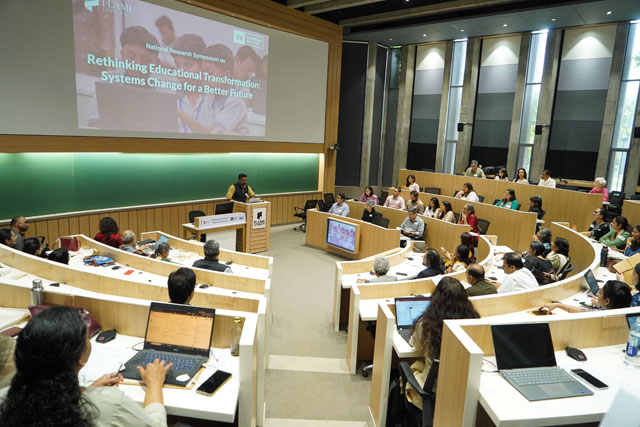FLAME University hosts a symposium on Rethinking Educational Transformation: Systems Change for a Better Future
FLAME University and Leadership For Equity jointly convened a national research symposium on 'Rethinking Educational Transformation: Systems Change for a Better Future', on July 5th-6th, 2023, at FLAME University, Pune.
Education is a fundamental pillar of any society, and change in education systems is the most important way to leapfrog our way into creating a more rigorous and equitable educational environment for future generations. The symposium was a step in this direction, with the aim of generating evidence-based insights on achieving large-scale systemic change in Indian education.
The symposium featured noted stalwarts, business leaders, and celebrated academicians who shared their insights and learnings on the emerging trends in the public education system of India. Some of the key speakers and attendees included Prof. Karthik Muralidharan, Tata Chancellor's Professor of Economics, UC, San Diego, and Founder, CEGIS India; Anu Aga, Director of Board, Thermax Ltd; Meher Pudumjee, Chairperson, Thermax Ltd; Prof. Padma M. Sarangapani, Chairperson, Centre of Excellence in Teacher Education, Tata Institute of Social Sciences, Mumbai; Prof. Milind Sohoni, Indian Institute of Technology, Bombay; and Dr. Ghulam Omar Qargha, Fellow, Global Economy and Development, Center for Universal Education, The Brookings Institution, among others. Participants in the symposium had a chance to familiarise themselves with seminal research undertaken by leading national and global institutions.
At the event, leading Indian universities and research institutions pioneering studies in the sector presented their work, including Prof. Ankur Sarin from IIM Ahmedabad, who spoke on systems change and action research, and Janak Nabar, CEO, Centre for Technology, Innovation, and Economic Research, who discussed the role of technology and research in transforming higher education in India.
Representatives of UNICEF and The Abdul Latif Jameel Poverty Action Lab, Reshma Agarwal and Rhea Handa, respectively, shared their professional learnings on gender stereotypes in education and ways of scaling low-cost, high-impact best practices in the sector.
Sharing his thoughts on the systems change efforts at scale in the education sector, Prof. Kartik Muralidharan said, "Philanthropists, NGOs, and Universities should invest resources and efforts towards research and action in systems change, which can help identify and act on binding constraints to transform public education systems."
The symposium provided an important opportunity for sector leaders and academic experts to exchange ideas on the future of education systems in 21st-century India and also explore innovative research and evidence-based practices implemented by different organizations. Overall, the symposium saw more than 100 individuals from over 30 organizations attend the sessions over the course of two days.
About FLAME University:
FLAME University is the pioneer of liberal education in India, delivering the country's premier interdisciplinary education experience. It is driven to be one of India's most respected and reputed centers of learning, the premier destination of choice for higher education in the nation for learners and teachers, to push the design and nature of studies and to create a societal up-gradation phenomenon, particularly in the fields of liberal education and leadership. FLAME has been set up with an idealistic vision and a social commitment to contribute to society nobly. With 140+ esteemed faculty members, the university offers an unparalleled educational experience. The student-to-faculty ratio is 11:1, unmatched at the higher education level in India. Spread on 60 acres of green expanse with aesthetically designed infrastructure, the campus currently consists of five schools: FLAME School of Liberal Education, FLAME School of Business, FLAME School of Communication, FLAME School of Computing and Data Sciences and FLAME School of Design, Art & Performance. FLAME University has been established as a state-private university vide the FLAME University Act 2014 (Maharashtra Act No. II of 2015) of the Government of Maharashtra. It is recognized by the University Grants Commission (UGC) under Section 2(f), and degrees awarded by the University are recognized under Section 22 of the UGC Act, 1956.
Website: https://www.flame.edu.in/

Comments
Post a Comment